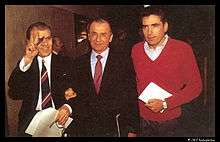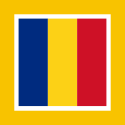Petre Roman
| Petre Roman | |
|---|---|
 | |
| Prime Minister of Romania | |
|
In office 26 December 1989 – 1 October 1991 Acting until 20 June 1990 | |
| President | Ion Iliescu |
| Preceded by | Constantin Dăscălescu |
| Succeeded by | Theodor Stolojan |
| President of the Senate | |
|
In office November 1996 – February 2000 | |
| President | Emil Constantinescu |
| Prime Minister |
Victor Ciorbea Gavril Dejeu (Acting) Radu Vasile Alexandru Athanasiu (Acting) |
| Preceded by | Oliviu Gherman |
| Succeeded by | Mircea Ionescu Quintus |
| Minister of Foreign Affairs | |
|
In office 22 December 1999 – 28 December 2000 | |
| President | Emil Constantinescu |
| Prime Minister | Mugur Isărescu |
| Preceded by | Andrei Pleșu |
| Succeeded by | Mircea Geoană |
| Personal details | |
| Born |
22 July 1946 Bucharest, Romania |
| Political party | National Liberal Party (2008–present) |
| Other political affiliations |
National Salvation Front (1989–1992) Democratic Party (1992–2003) Democratic Force (2003–2008) |
| Spouse(s) |
Mioara Georgescu (1974–2007) Silvia Chifiriuc (2009–present) |
| Profession | Engineer |
| Religion | Romanian Orthodox Church |
Petre Roman (Romanian pronunciation: [ˈpetre ˈroman]; born 22 July 1946) is a Romanian politician who was Prime Minister of Romania from 1989 to 1991, when his government was overthrown by the intervention of the miners led by Miron Cozma. He was the first prime minister since 1945 who was not a Communist or fellow traveler. He was also the president of the Senate from 1996 to 1999 and Minister of Foreign Affairs from 1999 to 2000. He was leader of the Democratic Force party, which he founded after leaving the Democratic Party in 2003. Currently, he is an MP in the Lower Chamber, elected in 2012. He had been removed from his seat in 2015 after being charged by the National Integrity Agency with incompatibility, but restored to office in 2016 after the Court of Appeals overturned the ruling. He is also a member of the Club de Madrid, a group of more than 80 former democratic statesmen, which works to strengthen democratic governance and leadership.[1]
Background
Roman was born in Bucharest. His father, Valter Roman, born Ernst or Ernő Neuländer of Transylvanian Hungarian–Jewish descent,[2] was a veteran of the Spanish Civil War, a Comintern activist, and a prominent member of the Romanian Communist Party. His mother Hortensia Vallejo was a Spanish exiled who would become director of the Spanish session of Radio Romania International.[3] The couple married in Moscow, and he has several siblings. In 1974 Roman married Mioara Georgescu, with whom he has a daughter, Oana. In February 2007, husband and wife confirmed that they were divorcing; the divorce was made final on Good Friday, 6 April 2007. In June 2009, he married a pregnant Silvia Chifiriuc (who is 26 years his junior) in a Romanian Orthodox wedding.[4]

Roman first rose to prominence during the Romanian Revolution of 1989, when he was among the crowd occupying the National Television building, and broadcasting messages expressing revolutionary triumph. He became provisional prime minister after the overthrow of the Communist regime, and was confirmed in office in June 1990, three months after the country's first free election in 53 years.
Notes
- ↑ "Petre Roman". Club de Madrid. Retrieved 28 December 2012.
- ↑ http://www.nytimes.com/1989/12/27/world/upheaval-in-the-east-leadership-an-aristocrat-among-the-revolutionaries.html
- ↑ P.Roman "Libertatea ca datorie"
- ↑ (Romanian) "Petre Roman s-a cununat religios cu Silvia Chifiriuc" ("Petre Roman Has Religious Wedding with Silvia Chifiriuc"), Mediafax, 6 June 2009; accessed 6 June 2009
External links
- Official site at the Wayback Machine (archived 25 January 2007) (site down as of 12 November 2008)
- fragments from Petre Roman's book "Libertatea ca datorie", ed. Dacia- Cluj, 1994
| Political offices | ||
|---|---|---|
| Preceded by Constantin Dăscălescu |
Prime Minister of Romania Acting: 1989–1990 1989–1991 |
Succeeded by Theodor Stolojan |

